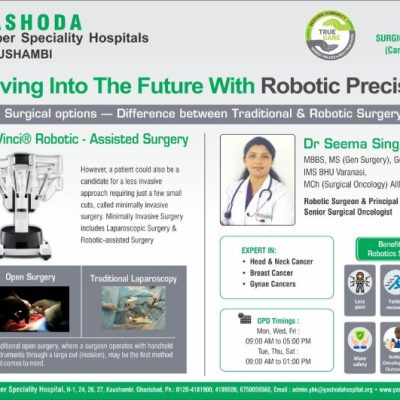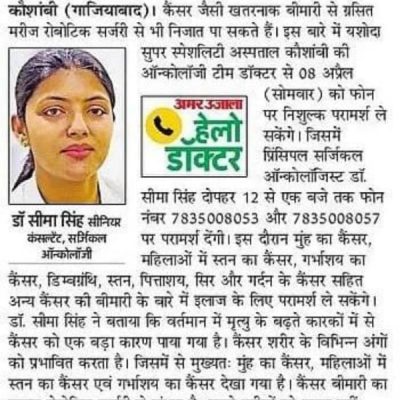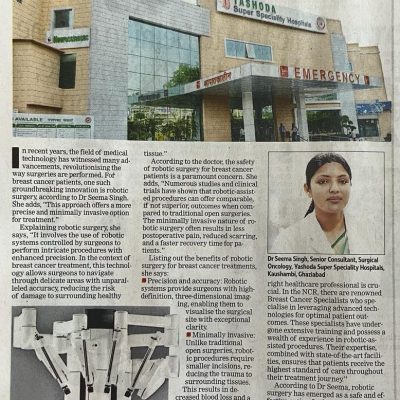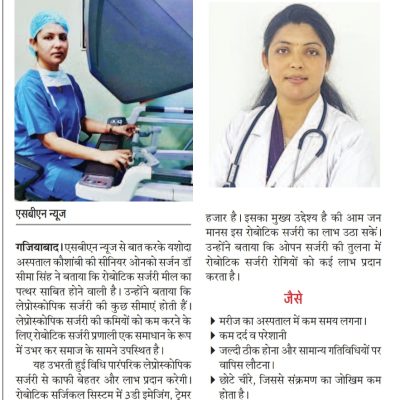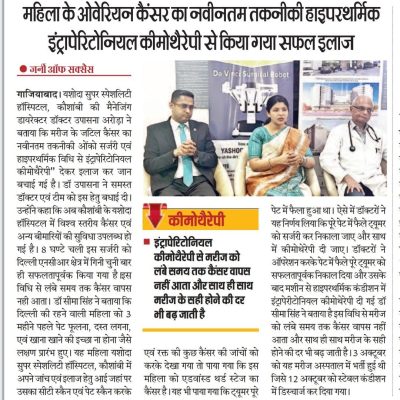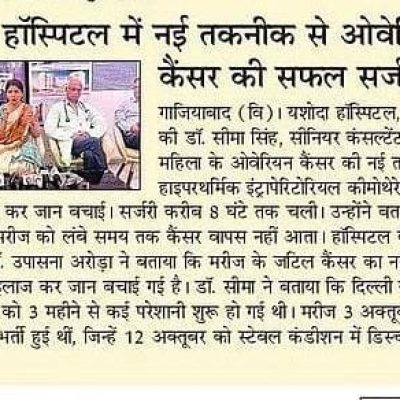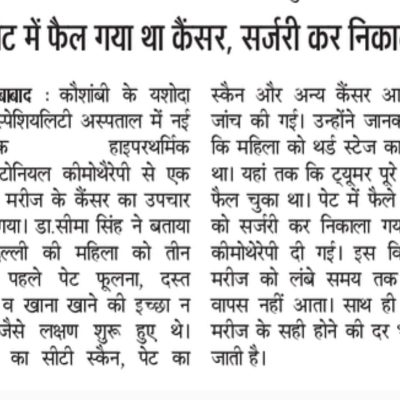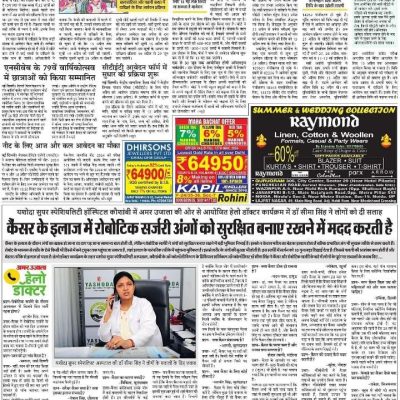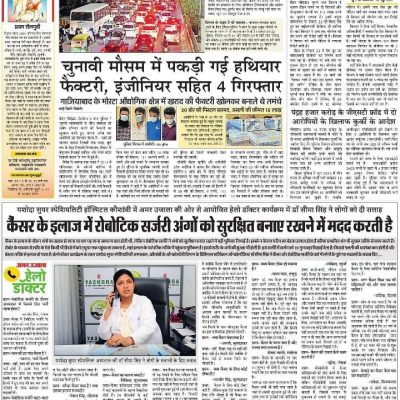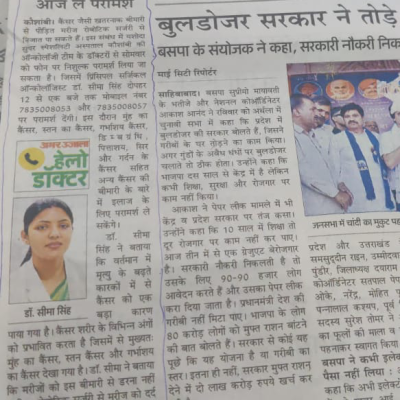




Cancer Doctor in Ghaziabad
Best Robotic Surgical Oncologist in Delhi NCR
Dr. Seema Singh is an accomplished Surgical Oncologist with an experience of over 14 years. Currently Dr. Seema is working as Principal Consultant Surgical Oncologist at Yashoda Super Speciality Hospitals, Kaushambi, Ghaziabad. She was previously working as a Consultant Surgical Oncologist at Rajiv Gandhi Cancer Institute and Research Centre (RGCIRC). She has also gained experience as a surgical oncologist at AIIMS, New Delhi.
Dr. Seema Singh specializes in surgical oncology and has gained valuable experience treating various types of cancer, such as Ovarian Cancer, Cervical Cancer, Gall Bladder Cancer, Head and Neck Cancer, Uterine Cancer, Breast Cancer and Thyroid Cancer.
Area of

Breast Cancer
Breast cancer is when the cells in the breast start growing uncontrollably. There are various types of breast cancer and its determined by which cells in the breast become cancerous.
Read More

Ovarian Cancer
Ovarian cancer begins in your ovaries. It happens when some cells in your ovaries or fallopian tubes start growing and multiplying too much, getting out of control.
Read More

Uterine Cancer
Uterine cancer has two main types Uterine sarcoma which develops in the muscle wall of the uterus whereas Endometrial cancer develops in the inner lining of your uterus.
Read More

Head And Neck Cancer
Head and neck cancer is a group of cancers that usually begin in the cells lining your mouth, throat (pharynx), or voice box (larynx).
Read More

Cervical Cancer
Cervical cancer is a type of cancer that affects the cervix, the lower part of the uterus. Regular screenings and HPV vaccination can help prevent it.
.
Read More

Gall Bladder Cancer
Gallbladder cancer is a rare form of cancer that starts in the gallbladder. Symptoms may include abdominal pain, jaundice, and weight loss.
Read More
Get expert guidance from renowned cancer specialist, Dr. Seema Singh through our online consultation service. Schedule your personalized session today and take the first step towards healing.
UPI For Indian Patients Only
FEE : ₹ 999 only
Scan the code and enjoy a hassle-free transaction experience.
Paypal For Non Indian Patients Only

Years of Experience

Medical Specialities

Successful Therapy

Happy Patients
Patient testimonials
Rakesh Mewari
Patients Relative
My relative has been a patient of Dr. Seema Singh for the past year and she is an absolute gem! The care she provides is unparalleled and her skill as a surgical oncologist is second to none. I highly recommend her services to anyone looking for the best Surgical Oncologist in Ghaziabad.
Savita Sharma
Breast Cancer Patient
She was a wonderful surgeon, and the staff was always helpful and kind. They ensured I had a smooth prep, surgery, and follow-up. I am so glad I chose her and would highly recommend to anyone. Anyone looking for a breast cancer specialist should surely visit her.
Neha Singh
Uterine Cancer Patient
Very professional doctor with a very clear approach towards treatment. The BEST part is the doctor can be approached any time of the day, they are there to extend help which is rare during these days. Overall one can not get a better treatment along with a professional and caring attitude of the doctor.
Frequently Asked Questions
How does cancer start?
Your body is made up of cells. Usually, these cells grow, divide, and eventually die, making room for new ones. But sometimes, some cells start to change in a bad way. Instead of dying, they grow and multiply too much, forming a lump called a tumour.
Tumours can be two types: one that is not harmful (benign) and another that is harmful (malignant or cancerous). The dangerous tumours can attack and damage the healthy parts of your body. Moreover, they can spread to other places in the body, creating new tumours there. This spreading is called metastasis, and it’s a sign that the cancer has reached an advanced stage.
What are the stages of cancer?
Stage 0: At this stage, cancer is still in the place where it started and hasn’t spread to nearby tissues. Stage 0 cancers can often be cured.
Stage I: This stage usually means there is a small tumour or cancer that hasn’t deeply grown into nearby tissues. It’s also known as early-stage cancer.
Stages II and III: In these stages, the cancers or tumours are larger and have grown more deeply into nearby tissues. They may have also spread to nearby lymph nodes, but haven’t reached other organs or parts of the body.
Stage IV: Cancer in this stage spreads to other organs or parts of the body. It’s sometimes called advanced or metastatic cancer.
Does cancer have symptoms?
Cancer can show different signs and symptoms depending on where it is in the body and how big it has become. Some common signs can be:
- Losing weight without any clear reason
- Having a fever that doesn’t go away
- Feeling very tired and weak
- Changes in your skin’s appearance
- Experiencing changes in your bowel habits or difficulty with urination
- Sores that take a long time to heal
- Noticing unusual bleeding or strange discharges from the body
- Feeling a lump or thickening in a part of your body, like a breast
- Having trouble swallowing or having indigestion
- A persistent cough or hoarseness in your voice
It’s important to remember that these signs can be caused by various reasons, not just cancer. To find out the exact cause of these symptoms, it’s essential to visit your doctor for proper evaluation and diagnosis.
Can Cancer Be Cured?
Whether a person can be completely cured of cancer depends on various things like what type of cancer they have, how far it has grown (the stage), the available treatment options, and other factors. Different cancers have different chances of being cured.
It’s essential to understand that there’s no one-size-fits-all cure for cancer. Each type of cancer requires its own specific treatment plan.
Get In Touch
Articles
Our Latest Blog
- March 29, 2024
- Dr Seema Singh
Can Breast Cancer Come Back? How Will I Know
Being diagnosed with cancer is tough, not just for the patient but for their loved ones too. Breast…
- March 29, 2024
- Dr Seema Singh
How Can You Protect Yourself from Breast Cancer?
Breast cancer is a significant concern for women in India, particularly in urban areas, where lifestyles can contribute…
- March 28, 2024
- Dr Seema Singh
Robotic Surgery: Benefits, How It’s Done, and What’s Next
Robotic surgery has changed how surgeries are done, bringing many benefits over traditional methods. Instead of relying solely…




